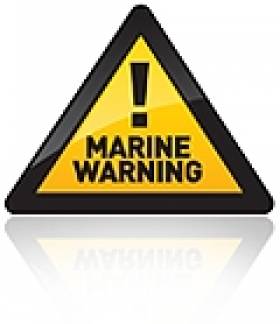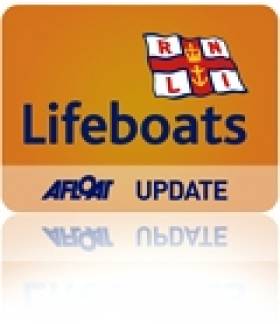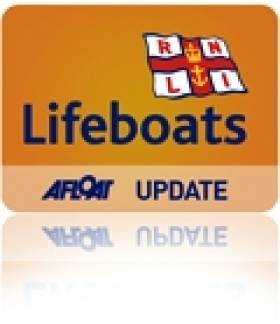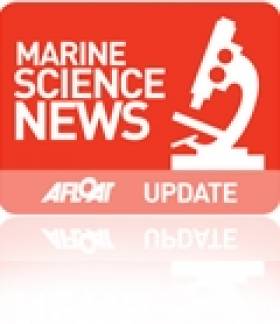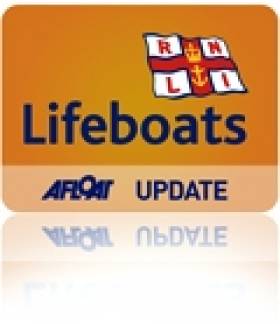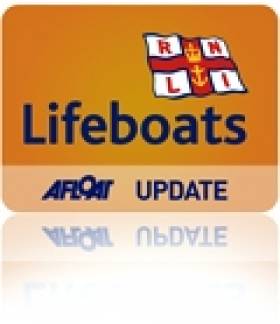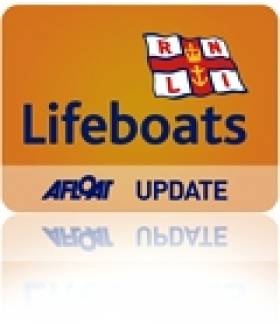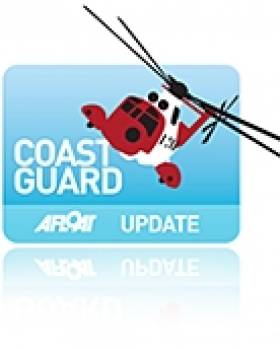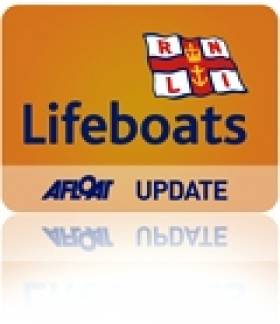Displaying items by tag: Lifeboat
Warning Issued Over Inflatable Toys Being Swept Out to Sea
Coastguard Sector Manager George Crumpler says,
"Inflatable boats and toys can be great fun, but we'd rather that you used them in swimming pools than at the beach. If you do use one at the beach, tether it to an adult and never use it in an offshore wind. Inflatables can easily be blown out to sea and, overturn.
Make sure that children are properly supervised. We deal with lost children every year and it can be distressing for children and adults alike. Try to go to a lifeguarded beach if you can and stay within the flagged area.
"Remember to check the weather and the tide times (these can often be found at the entrance to the beach) so that the tide doesn't take you by surprise or cut you off.
"If you see anyone in difficulty, tell the lifeguard if one is available or call the Coastguard on 999.
Remember to have a great time and return home safely."
If you want to prepare for your day out on the coast, you might like to visit Directgov for Kids where there are games and activities for children. Visit http://kids.direct.gov.uk/ and click on the world, then go to the 'watch station' in the 'places' icon.
Vessel Towed to Ballycotton Harbour by Lifeboat-Update
Ballycotton RNLI lifeboat launched today, 12 July, to lend assistance to a 40 foot pleasure craft that ran into difficulties one mile east of Ballycotton lighthouse. The pleasure craft fouled its propeller on rope while on passage and sought assistance. A lifeboat crewmember was put aboard the pleasure craft and attempts were made to free the offending rope but without success. A towline was established and the casualty was towed to Ballycotton harbour, where they arrived safely at 16:00.
Related Safety posts
RNLI Lifeboats in Ireland
Safety News
Rescue News from RNLI Lifeboats in Ireland
Coast Guard News from Ireland
Water Safety News from Ireland
Marine Casualty Investigation Board News
Marine Warnings
Ballycotton RNLI lifeboat launched this afternoon to a 40–foot pleasure craft which has a foulded propeller, a mile east of Ballycotton lighthouse in East Cork. They are on scene at present (15:14) and are attempting to free the propellor. Update to follow.
Lifeboat Towing Yacht to Ballycotton Harbour
Ballycotton RNLI lifeboat launched this evening at 17:15 to lend assistance to a 31 ft. yacht who sought assistance 4 miles east of Ballycotton in East Cork. The lifeboat arrived on-scene and established a towline at 17:50. The Irish registered yacht, with four persons aboard, is under tow to Ballycotton harbour. They are expected to arrive at approx. 18:45.
The Marine Institute is having a Summer Fête – Family Fun Pirate Day at its headquarters, Rinville, Oranmore on Sunday 11th July from 1.00 pm to 5.30 pm in aid of Galway Lifeboat. Admission is free.The fun day offers a great opportunity to meet friends, enjoy a range of cakes, tasty treats and a sausage sizzle courtesy of the Harbour Hotel, Kylemore Abbey and Compass Catering, while listening to live music overlooking Galway Bay. There will be items to purchase and a range of activities for all the family including face painting, cartoon classes, magic show, bouncy castles, art & crafts, marine displays and lots more fun activities and games."Since many of our staff go to sea on research surveys we appreciate the work done by the Galway Lifeboat and are anxious to help in any way we can," said Marine Institute CEO Dr. Peter Heffernan. "The event promises to be a fun-packed day for adults and children alike - particularly those who are interested in learning more about the work of the Marine Institute and the marine community in Galway".For those interested in viewing the architecture of the Institute's award winning building, tours will be available throughout the afternoon.The Marine Institute wishes to thank all of the exhibitors, sponsors and contributors taking part in the Summer Fête in aid of the Galway Lifeboats Ireland.All proceeds from the day will go to Galway Lifeboats.Further information is available on the Marine Institute's web site at www.marine.ie
The Marine Institute is having a Summer Fête – Family Fun Pirate Day at its headquarters, Rinville, Oranmore on Sunday 11th July from 1.00 pm to 5.30 pm in aid of Galway Lifeboat. Admission is free.
The fun day offers a great opportunity to meet friends, enjoy a range of cakes, tasty treats and a sausage sizzle courtesy of the Harbour Hotel, Kylemore Abbey and Compass Catering, while listening to live music overlooking Galway Bay. There will be items to purchase and a range of activities for all the family including face painting, cartoon classes, magic show, bouncy castles, art & crafts, marine displays and lots more fun activities and games.
"Since many of our staff go to sea on research surveys we appreciate the work done by the Galway Lifeboat and are anxious to help in any way we can," said Marine Institute CEO Dr. Peter Heffernan. "The event promises to be a fun-packed day for adults and children alike - particularly those who are interested in learning more about the work of the Marine Institute and the marine community in Galway".
For those interested in viewing the architecture of the Institute's award winning building, tours will be available throughout the afternoon.
The Marine Institute wishes to thank all of the exhibitors, sponsors and contributors taking part in the Summer Fête in aid of the Galway Lifeboats Ireland.
All proceeds from the day will go to Galway Lifeboats.
Further information is available on the Marine Institute's web site at www.marine.ie
Pwllheli RNLI Lifeboat Assists Yacht Bound for Cork
Pwllheli's RNLI all weather lifeboat was launched on Monday evening to assist a yacht which was drifting towards the shore.
The 37ft vessel with two people on board suffered engine failure around a mile south of the town and an attempt was made to lay the anchor but the rope entangled in the propellor.The lifeboat was launched soon after 10pm after flares were sighted being fired from the yacht.
A strong south westerly wind was pushing the yacht towards Gimblet Rock and it was around half a mile from the rock when located by the all weather lifeboat. The vessel, which was on passage from Pwllheli to Cork, was towed to the marina by the RNLI lifeboat.
Baltimore Lifeboat Search for Missing Man
The RNLI Inshore Lifeboat Bessie was called to assist in a search for a man who failed to make a pre-arranged meeting with a friend in Baltimore yesterday. The man had been camping on the Islands of Roaring Water Bay, and had left his Jeep in Baltimore. When the alert was raised at 20:18, it was unclear where the man might have been intending to stay that night. A search was initiated by Helmsman John Kearney and crewmen Micheal Cottrell and Paul O’Driscoll extending from Barlogue Creek at the mouth of Lough Hyne and into Roaring Water Bay. The Schull inshore lifeboat and the Coast guard helicopter were also involved in the search. The search was stood down last night as darkness fell and recommenced this morning at 05:15 with Helmsman Kieran Collins and crewmen Ronan Sheehy and Jim Baker on board the RNLI inshore lifeboat Bessie.
Man Dragged from Capsized Dinghy at Newtownards Sailing Club
At around 11.45 this morning Belfast Coastguard received an urgent call for assistance to the Newtownards sailing club where four people were in difficulty, two of them children. One man is unconscious, and in a poor way.
An upside down Lazer 2000 dinghy was spotted by a sailing instructor who went to render assistance to those in the water. The crew of a further incoming rigid inflatable boat also helped.
A man in his 50s was then pulled from the water and brought ashore. He is in a very poor way and cardio pulmonary resuscitation has been administered both in the incoming vessel and ashore. The second adult who had been in the upturned dinghy also assisted. Two children who were also in the water are cold, wet and in a state of shock but otherwise unharmed. All four were wearing lifejackets but the lifejacket on the casualty did not inflate.
The Portaferry inshore lifeboats were launched plus the Bangor Coastguard Rescue Team attended. Local police were also in attendance. An ambulance is also on scene.
Rob Steventon, Watch Manager at Belfast Coastguard said
"Along with the Police we are still gathering further details, but we do not know as yet how long the dinghy had been upturned or how long they had been in the water as the first report was by someone who was going out on to the water and had seen the hull of the craft.
"We urge boaters strongly to check their life saving equipment and general safety equipment to ensure everything is working correctly. The Marine Accident Investigation Branch has been informed."
UK Coastguard Now Has 40,000 Beacons on its Register
The UK 406 EPIRB Registry based at MRCC Falmouth reached a new milestone this month by registering their 40,000th beacon, meaning the database has doubled in size in three years. The team has worked tirelessly to provide good customer service and maintain operationally valid records and as such the Registry is well respected throughout the SAR world.
The importance of the 406 MHZ beacon was highlighted by the safe rescue of four people from the Yacht Hollinsclough in the deep Southern Atlantic recently. The vessel had two correctly registered beacons which supplied key data to both national and international search and rescue authorities.
Steve Huxley, SAR Communications Manager said:
If you are a boat owner, consider buying an emergency beacon as part of the life- saving equipment fit to your vessel.
Emergency Position Indicating Radio Beacons have proved many times that they have contributed to the saving of lives.
999 call prompts rescue of six men off Swansea
Swansea Coastguard called out the Mumbles Coastguard Rescue team and requested the launch of the Mumbles RNLI inshore lifeboat.
The lifeboat upon reaching the drifting vessel discovered the craft was carrying six men of chinese origin, it was taking on water due to the boat having no bung, and there was no lifesaving equipment whatsoever.
The South Wales police were alerted to the incident and despatched a unit to question the men. The six men are being interviewed by the police.
Dai Jones, Watch Manager, Swansea Coastguard said:
If we had not been alerted to this drifting vessel by the member of the public, this incident could so easily have had a different outcome.
The vessel was drifting towards where the tide flows extremely fast and it would have carried this craft and it's six occupants to extreme danger.
As the vessel was taking water and not a lifejacket between them, we could easily have been looking at a fatal incident.



























